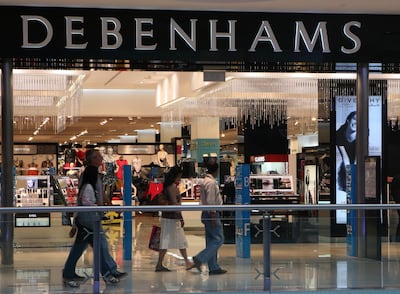British retailer Debenhams is set to close after failing to find a buyer in last-ditch efforts to rescue the brand, administrators FRP Advisory said on Tuesday.
The department store, which has been a feature of the UK high Street for more than 200 years, said it would start a wind-down of the brand while continuing to seek offers for all or parts of the business.
It means 12,000 British employees at 124 UK stores face losing their jobs, just a day after Philip Green's Arcadia fashion group entered administration, threatening about 13,000 jobs.
Alshaya Group, the Middle East franchise owner of Debenhams, which has 26 Debenhams stores across the Middle East, including nine in Saudi Arabia and six in the UAE, said its operations would continue.
"Whilst the UK high street faces ongoing challenges, Alshaya Group confirms that today's UK news announcements about Arcadia Group and Debenhams do not affect its Middle East business operations and our stores will continue to welcome customers as normal," Alshaya told The National on Tuesday.
Debenhams Group said its sale process did not result "in a deliverable proposal".
"Given the current trading environment and the likely prolonged effects of the Covid-19 pandemic, the outlook for a restructured operation is highly uncertain,” the company said in a statement.
“The administrators have therefore regretfully concluded that they should commence a wind-down of Debenhams UK, whilst continuing to seek offers for all or parts of the business.”
British retailers have been hammered this year with physical stores forced to shut during two lockdowns and consumers switching to online. The industry is set to lose 235,000 retail jobs, according to the Centre for Retail Research, with the collapse of two of the country's best-known retailers, putting 25,000 jobs at risk in less than 24 hours, one of the harshest blows this year.

Arcadia, the owner of leading fashion brands Topshop, Burton, Dororthy Perkins and Miss Selfridge, is headed by the colourful retail tycoon Sir Philip Green, 68, who is famed for lounging on his luxury yacht during the collapse of the department store BHS in 2016, which he had managed to offload the year before.
Arcadia has now hired administrators from Deloitte to evaluate all options for the group while it continues to trade.
Meanwhile, Debenhams fell into administration for the second time in April, with hopes of a rescue resting on the sportswear brand JD Sports.
During the administration process, options for the business included a sale of all or part of the UK business, a further restructure of the brand’s operations or “the orderly wind-down” of the business.

After the sports chain pulled out of the deal, any hopes the 242-year-old department store could be saved were dashed, with the decision instead to close the business. The company had already cut about 6,500 jobs since May as it struggled to stay afloat.
Staff were told the news on Tuesday morning, with the brand continuing to trade across the UK and online to clear stock.
Geoff Rowley of FRP Advisory, joint administrator to Debenhams and partner at FRP, said all reasonable steps were taken to complete a transaction that would secure the future of Debenhams.
“However, the economic landscape is extremely challenging and, coupled with the uncertainty facing the UK retail industry, a viable deal could not be reached,” he said.
“The decision to move forward with a closure programme has been carefully assessed and, while we remain hopeful that alternative proposals for the business may yet be received, we deeply regret that circumstances force us to commence this course of action.”
In the UAE, however, both Debenhams and any stores linked to Arcadia will remain unaffected by the crisis in the UK, as they are all operated by the Kuwaiti, family-owned retail company Alshaya Group.
This means there will not be any store closures in UAE malls, says David Macadam, chief executive of the Middle East Council of Shopping Centre.
"The impact to the franchise holders for these brands occurs much later and to a far less extent in the Mena region," said Mr Macadam.
"It takes time to filter through the system to reach this end of the world and in the meantime, it's pretty much business as usual, as long as the inventory is there."
Sandeep Ganediwalla, partner at the Middle East practice of India's Redseer Consulting, said this is not the first time a UK chain has gone through administration without affecting its UAE operations. He points to the collapse of Jamie Oliver's restaurant group last year, which did not affect Jamie's Pizzeria in Jumeirah Lakes Towers.
"There are a lot of brands in the UK or other parts of the world that have gone into administration but because this is a franchise operation, the franchise operators have decided to continue with the brand," said Mr Ganediwalla.
"It depends on whether customers think the brand is tarnished and whether sourcing continues. If the underlying designers go out of business and there is no stock for Debenhams to stock here, then that is a challenge. If that is not the case, I would not be surprised if Debenhams continues to operate in some form. Having said that they have been struggling here and closing locations here as well."
He noted the US brand Borders, which went into administration in 2011, yet its UAE franchise owner Al Maya Group continues to operate 17 stores across the Emirates, with other outlets in Oman and Qatar.
Meanwhile, former Debenhams chairman Sir Ian Cheshire told the BBC he felt desperately sorry for the company’s employees.
Richard Lim, chief executive of the consultancy Retail Economics, a consultancy, said the failure of two brands is “truly devastating” in a country where main streets are being increasingly hollowed out, said Richard Lim, chief executive of the consultancy Retail Economics, a consultancy.













